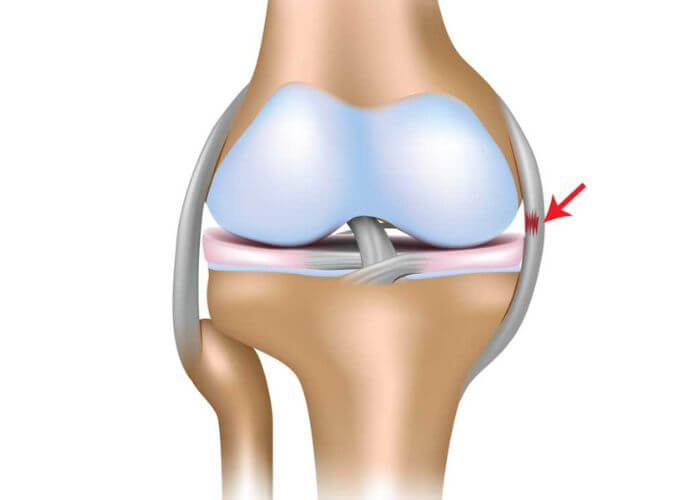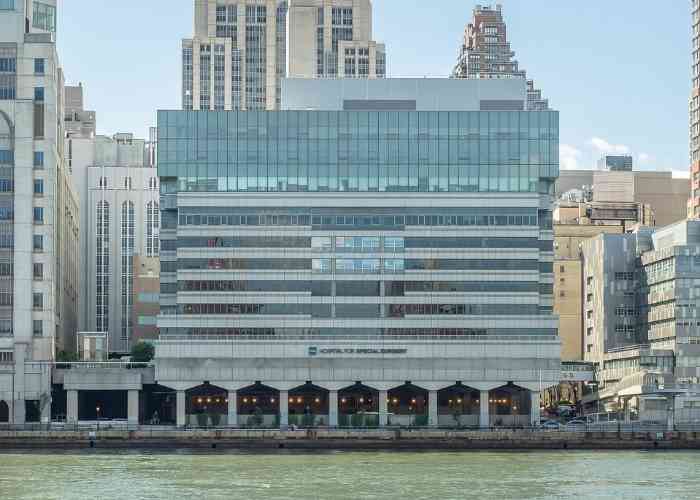What is a medial collateral ligament injury?
There are four major ligaments stabilizing the knee. The medial collateral ligament (MCL) travels along the inside (medial aspect) of the knee joint from the medial epicondyle, a bony prominence on the inner femur (thigh bone), to the medial condyle, a bony prominence on the inner tibia (shin bone). The MCL, in concert with the lateral collateral ligament (LCL), functions to provide stability to the knee with lateral side-to-side movements. The MCL is not as widely known as the anterior cruciate ligament (ACL), yet it is the most injured of the ligaments within the knee. An injury to the MCL is caused by a substantial force placed along the outer knee causing the knee joint to shift medially resulting in the MCL stretching or becoming partially or completely torn. MCL injuries are most common among athletes that participate in contact sports, such as football or wrestling. Dr. Answorth A. Allen, orthopedic knee specialist serving patients in Manhattan, New York City, Westchester, Long Island and surrounding areas, has the knowledge and understanding, as well as substantial experience in treating patients who have experienced an MCL injury.

Are there different types of MCL injuries?
Ligament injuries are typically graded on the amount of damage imposed on the ligament. MCL injuries are no different and are assigned to one of three classifications after evaluation of the injury.
- Grade 1: The ligament is simply pulled or stretched, so minimal damage is inflicted and the joint remains stable.
- Grade 2: The injury results in a partially torn ligament causing mild instability to the knee joint.
- Grade 3: The ligament is ruptured and completely torn into two separate pieces. The knee joint is no longer stable with a complete MCL tear.
What are the symptoms of an MCL injury?
The symptoms of an MCL tear are consistent with a number of other knee conditions, so it is important to consult an orthopedic knee specialist for a proper diagnosis. Common complaints of an MCL injury are as follows:
- Pain along the inside of the knee immediately following an injury
- Tenderness and swelling along the inner portion of the knee
- Decreased range of motion
- Knee instability, especially with more severe tears
- “Locking” or “catching” of the knees with movement
How is an MCL injury diagnosed?
A comprehensive medical history is obtained by Dr. Allen and a thorough physical examination is also performed to confirm a diagnosis of MCL injury. The best tool for confirming the diagnosis is magnetic resonance imaging (MRI). This diagnostic tool allows Dr. Allen to visualize the soft tissue structures within the knee complex and identify if any of these structures also sustained damage with the traumatic event.
What is the treatment for an MCL injury?
Non-surgical treatment:
Patients that have been diagnosed with grade 1 or grade 2 MCL injuries can be treated with conservative therapies alone. The application of a knee brace can help protect the injured ligament during the healing process. Non-steroidal anti-inflammatory medications in combination with RICE (rest, ice, compression, elevation) can be used for pain management and decrease the swelling associated with this condition. A physical rehabilitation program to restore function and stability to the knee joint may also be recommended once the pain and swelling dissipate.
Surgical treatment:
When conservative therapy is unsuccessful, or if a patient experiences a more severe MCL tear, Dr. Allen may recommend an MCL repair to restabilize the knee. Specialized surgical instruments, sutures and anchors are then used to suture the ligament back together or securely fasten the ligament to the bone. In the event of significant ligament damage that cannot be repaired, a tissue graft, either from the patient (autograft) or donor (allograft), will be used to reconstruct the MCL.
MCL Injury Specialist

Are you an athlete that participates in high-contact sports? If so, you may be an increased risk of sustaining a MCL injury. Injuries to the medial collateral ligament vary in severity and can cause pain, locking of the knee, and instability. Knee expert Doctor Answorth Allen provides diagnosis and specialized treatment plans for patients in Manhattan, New York City, Westchester, Long Island and surrounding areas. To reduce knee pain, contact Dr. Allen’s team today!






